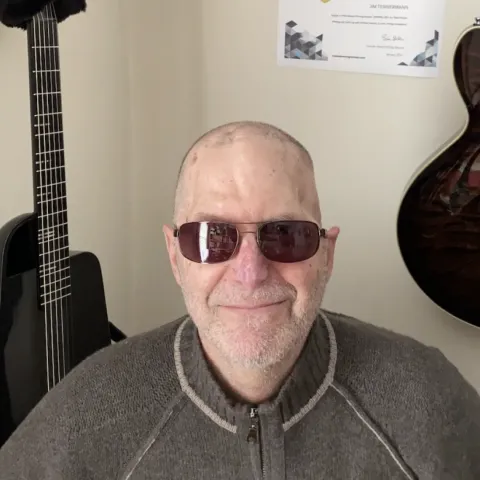
Jim Tennermann
I remember it like it was yesterday—the day I found out I had cancer for the first time. It was 1995, and I was just going about my life when I ended up in the emergency room. The doctors did some tests, and as I lay there in a hospital bed, a neurologist came over and said, "Mr. Tennermann, you have a brain tumor." It was as if time stopped. I couldn’t believe it, and I shot upright, yelling, "No!"—a reaction I didn’t know I had in me. That moment marked the beginning of a long and tumultuous journey.
I was about 36 at the time, and it was impossible not to think about my father, who had died of a brain tumor in 1967. I had always told myself that if anything like that happened to me, I wouldn’t let anyone touch my brain. But that decision changed the moment I got the news. I was in disbelief for days, but I had to face it.
The doctors removed the tumor—a large one, about the size of a hamburger, as I remember them saying. A second, smaller tumor followed seven months later. After those surgeries, I thought I was done with cancer. For a few years, it seemed like life had gone back to normal. I’d get regular MRIs, and eventually, even those stopped. But then, a few years later, it was déjà vu. Another tumor appeared in my brain, leading to more surgeries.
But that was just the beginning.
Over the next few decades, I would be diagnosed with not one, not two, but eight different cancers. After the brain tumors, I faced two types of skin cancer, kidney cancer in both kidneys, prostate cancer, lung cancer, and two rare forms of mesothelioma. Each new diagnosis hit like a ton of bricks, and the treatments that followed were grueling—surgeries, radiation, hormone therapy, you name it.
In 2018, the toughest diagnosis came: pleural mesothelioma. The surgery for that one was brutal. I was in the hospital for three weeks, and when I finally went home, I could barely walk. That surgery left me with only partial lung function. Climbing stairs is now a challenge, and every day, I have to adjust to this new normal.
Despite all of this, I’ve found ways to cope. I’ve been an avid cyclist for years, and after my first surgery in 1995, I thought I could just hop back on my bike and ride myself back to health. That turned out to be overly optimistic—I barely lasted a minute on a stationary bike before I had to go lie down. But over time, I regained my strength and was able to ride again. That feeling of getting back on the road, seeing the landscape, and thinking, "I’m back"—it was pure joy. Even now, though my lung capacity isn’t what it used to be, I ride an e-bike to keep that passion alive.
One of the hardest things about cancer is how people talk about it. Everyone says you need to "fight" cancer, but that word doesn’t quite capture the reality. It’s not always about fighting—sometimes you need to live with it, swim with it, even embrace it. Cancer isn’t some alien invading your body. It’s a part of you, and you learn to deal with it in ways that go beyond just "fighting."
I’ve also been fortunate in one respect: after my first mesothelioma diagnosis, I discovered I have a rare genetic mutation in the BAP1 gene, which predisposes me to certain cancers. It was a relief in a way—it helped explain why this was happening. It wasn’t just bad luck or some fault of mine. I found some peace in that, though it also meant I had to keep a close eye on my health and stay vigilant for new tumors.
This journey hasn’t just been mine, though. My brother wasn’t as lucky—he passed away from liver cancer in 2008, which was heartbreaking. I’ve lived longer than he did, but his death during one of my own recoveries was a bitter pill to swallow.
Now, I’ve been through so much that I’ve decided to write a book. It’s a guide for people who find themselves where I was—receiving a cancer diagnosis and feeling completely lost. The first thing you have to do is stop feeling sorry for yourself. You need both feet on the ground because there are decisions to make, things to learn, and you can’t do that if you’re buried in self-pity. I’ve learned a lot along the way, and I hope my story can help others.
Life after eight cancer diagnoses is different, but it’s still life. I still play guitar, still ride my bike, and still wake up each day ready to face whatever comes next.
